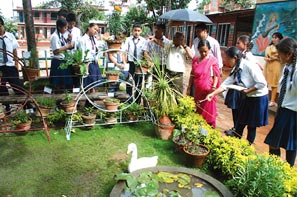Schools going herbal in and outside of Kathmandu

Kathmandu: On World Environment Day, June 5 2010, International Center for Integrated Mountain Development (ICIMOD) and the National Trust for Nature Conservation (NTNC), in collaboration with the Private and Boarding Schools’ Organization of Nepal (PABSON) launched a competition for 15 schools within Kathmandu.
Unlike schools competing to win the championship in sports or the arts, the participants spent months tending to their own herbal garden in their schools.
Over a year later, the project is not just on-going, it is expanding as seven schools have decided to pass on the Herbal Garden in Schools initiative to other schools.
According to ICIMOD, “The Promoting Herbal Gardens in Schools has been a fun-filled learning activity for the children where they got the opportunity to learn about the medicinal plants by actually planting the medicinal herbs and watching them grow in their garden, and by exploring information about them from various sources. The task of making the garden itself has been enriching in terms of making children realize the importance of team work such as detailed planning, and allocation of tasks within a team.”
But beyond just benefiting the students, the teachers too have been able to gain from the gardens, as ICIMOD reports, “For the teachers, herbal garden project has been useful in terms of the ease with which they could integrate the concept with other activities, such as writing essays, poems and stories, making posters, drawing and painting, making herbariums, and even preparing food recipe using some of the culinary herbs students have planted in their gardens.”
Originating with the idea of promoting medicinal herbs of the Himalayan Mountains, the project’s goal was to educate the younger population of the uses of plants in the region. And there is good reason to promote these herbs as “these plants have been grown or collected for thousands of years, and the traditional knowledge about the plants and their uses have been come down by word of mouth from generation to generation.”
However, due to a multitude of reasons ranging from overharvesting, loss of habitat, increasing urbanization and shrinking forest resource base, the knowledge and tradition that comes with these herbs are at a risk of being lost.
Thankfully, according to Achala Thapa, principal of Vajra Academy, “The program on promoting Herbal Gardens in Schools has innovatively involved students in creating awareness about herbal plant resources, which as a matter of fact has been ignored in the existing education system.”
Vajra Academy won the title of ‘Best Herbal Garden’ for transforming a barren slope into an herbal garden.
The school engaged all their students and encouraged them to learn the name of the plants by giving their scientific names.
The other winners are Suryodaya Jyoti Secondary School and Ullens School tied for 1st Runners up, Loyalty Academy and Annal Jyoti Boarding School were 2nd Runners Up, and Rato Bangala and Aims Academy received a special mention.
Now in 2011, six schools, Aims Academy, Annal Jyoti Boarding School, Rato Bangala, Suryodaya Jyoti Secondary School, Ullens School, and Vajra Academy along with the NGO Environmental Camps for Conservation Awareness (ECCA) are replicating the program in various schools in and outside of the Valley.
As for promoting the project Achala Thapa adds, “My students, from all the grades have not only sown the plants in the garden, but have internalized them in their hearts. With enthusiasm, we are ready to replicate the concept and transfer the experience and knowledge to other schools in the community.”
Milan Dixit, Principal, Rato Bangala School too is excited about sharing the initiative and says, “Rato Bangala has an education outreach program in Dailekh, where we are working with 480 public schools. We are more than eager to take the concept there and spread awareness about herbal plants and their importance.”
Each of the seven participants will mentor three public schools with at least one school from outside of the Valley.
Nira Gurung, Communications Officer, Knowledge Management, at ICIMOD explains, “The schools will continue with the initiative with monitoring by ECCA. We hope that the concept will be taken up by more schools, and the communities. ECCA has a developed a strategy for this furthering and to ensure its sustainability in the long run.”
source: Thapa,Shreya (2011),"Schools going herbal in and outside of Kathmandu",republica, 21 Dec 2011
Posted on: 2011-12-21































